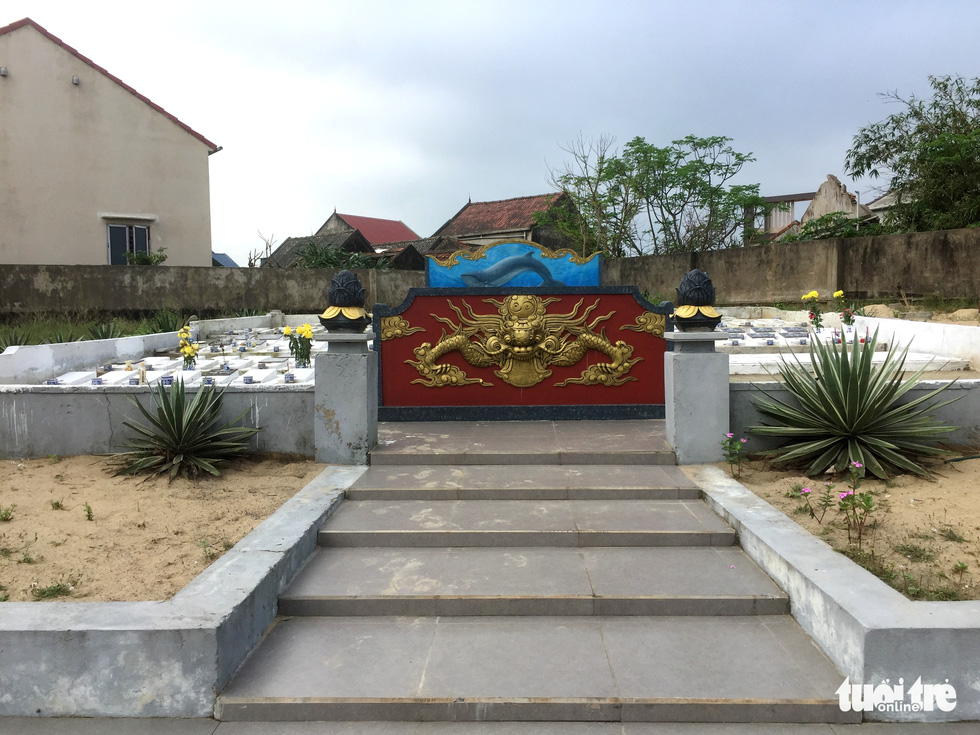When a dead whale washes ashore, inhabitants of coastal villages will gather to bathe the creature, then conduct the funeral service, prepare a grave and pay tribute to the whale like a person who has passed away.
This unique custom was formed hundreds of years ago in some coastal localities in the north central province of Ha Tinh and has been upheld until now.
A few days ago, in Dan Truong Commune, Nghi Xuan District in the province, a dead whale measuring some 1.5 meters long and weighing around 60 kilograms washed up near Luong Ninh Hamlet.
Local residents notified each other of the news. Then, they jointly moved the whale onto land, bathing it and conducting the burial service.
According to the beliefs of the locals, the whales wash ashore because they are exhausted after saving fishermen in distress.
The locals call whales Ca Ong, or “Sir Fish.”
Nguyen Thi Nga, a local official in Luong Ninh Hamlet, said that the custom of conducting burial services for whales was established in the area hundreds of years ago.
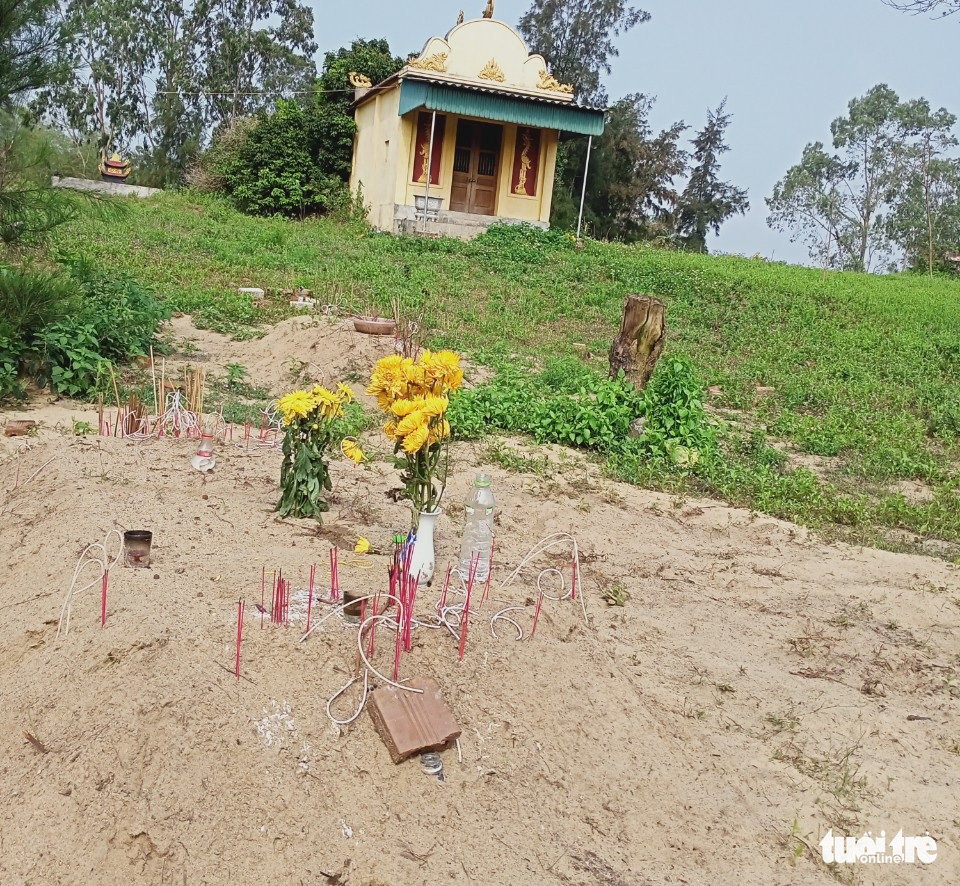 |
| A whale grave recently built by local people of Luong Ninh Hamlet, Dan Truong Commune, Nghi Xuan District, Ha Tinh Province. Photo: Le Minh / Tuoi Tre |
Legend has it that when seafarers of the previous generations were in distress in the sea, whales appeared to take them and their boats to shelter.
To express their gratitude to the whales, local residents began building temples to worship the fish.
“Local people see a dead whale washing ashore like seeing their loved ones. The first one to discover the dead whale will host the funeral, hire a monk to perform funeral rituals, conduct the burial service as well as be in mourning for the fish for 30 days,” Nga said.
Some 200 meters away from Luong Ninh Hamlet, local residents of Dan Truong Commune built a temple for whales.
On the first day and the 15th day of each lunar month, they give offerings to the whales and pray for favorable weather conditions, safe fishing trips, and lots of fish.
Whales as family members
Located around 60 kilometers away from Dan Truong Commune, a temple and tomb complex dedicated to whales covers thousands of square meters toward the beach of Cam Nhuong Commune, Cam Xuyen District in the province.
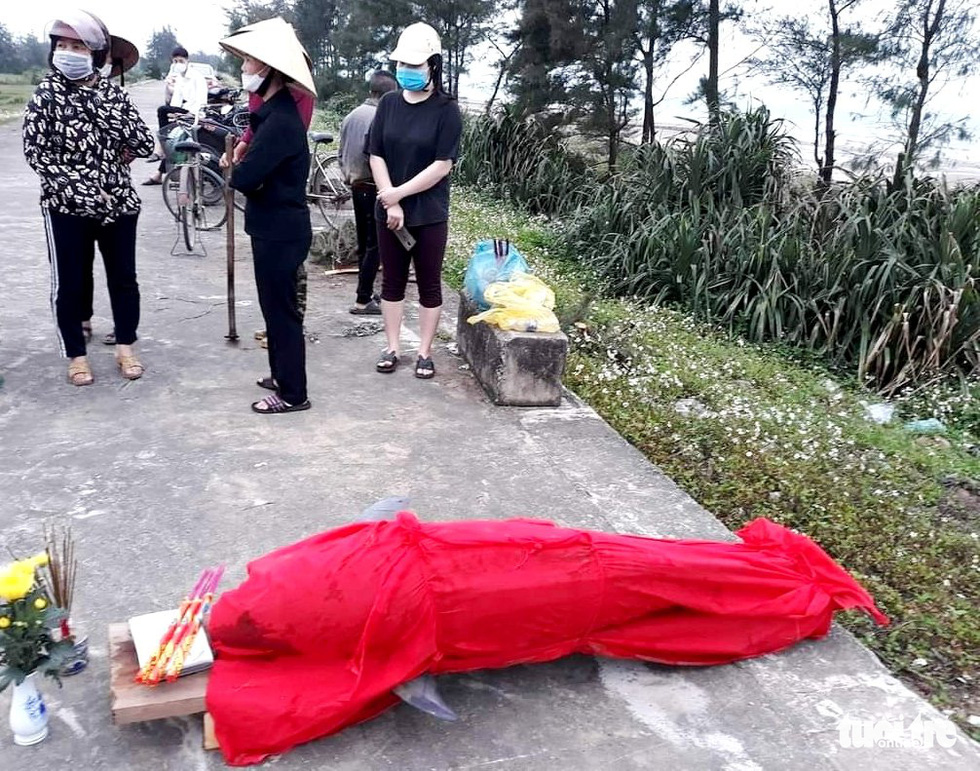 |
| A dead whale washing ashore is shrouded in red cloth as part of the burial service conducted by local people of Dan Truong Commune, Nghi Xuan District, Ha Tinh Province. Photo: Anh Thu / Tuoi Tre |
This is one of the largest temples to worship whales in Ha Tinh, dating some 600 years ago. It was ranked as a provincial cultural and historical relic in 2017.
Legend says that when King Le Thanh Tong in the 15th century and his subordinates encountered a storm during a boat trip, a whale suddenly showed up and led the king’s boat to the shore, and then it returned to the sea.
When coming home safely, the king bestowed on the whale the title of Hai Nhan Ngu Ton Than (the Deity of the Sea). The local people’s custom of conducting burial service and building temples to worship whales was created around this time and was passed down through generations.
In the 20th century, the Hai Nhan Ngu Ton Than temple was relatively small and experienced ravages of wars.
Around a decade ago, the temple underwent expansion, with graves of whales being rearranged. The temple complex comprises the main shrine to worship the Nam Hai Nhan Nhu Ton Than (the Deity of the Southern Sea) and a cemetery housing nearly 200 graves of whales.
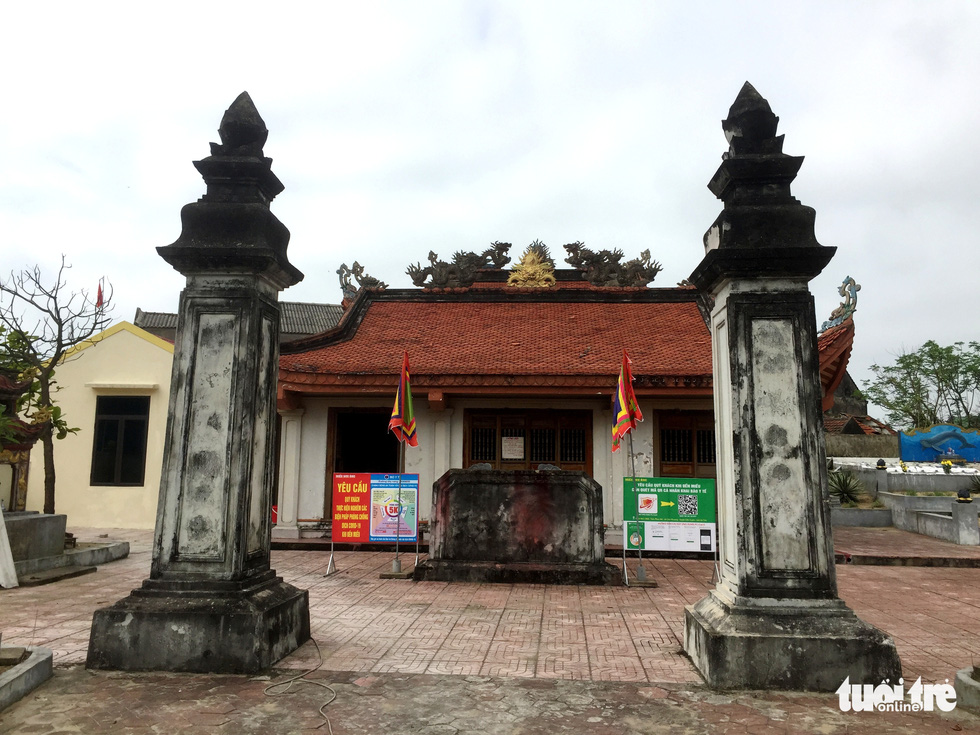 |
| The Ngu Ong Temple where local people worship hundreds of dead whales washing ashore in Cam Nhuong Commune, Cam Xuyen District, Ha Tinh Province. Photo: Le Minh / Tuoi Tre |
As shared by the head of management board of the Ngu Ong (Sir Fish) Temple, Nguyen Huu Phuong, a 64-year-old resident in Cam Nhuong Commune, most of the inhabitants in the commune do seafaring jobs, so they show great reverence for whales.
Once they see a dead whale washing ashore, they will use clean water to bathe the whale, then use wine to clean the fish again before using red cloth to wrap around it and conducting a proper burial for it.
“The rituals of worshipping whales are the same as those for a person who has died. After burying the fish, the first person to see the fish washing ashore has to be in mourning for the fish and hold a memorial service on the third day, the 49th day, the 100th day since the funeral.
"After two years, the whale will be reburied in another land in a brick or stone tomb,” Phuong continued.
The local fishermen will thoroughly name each whale washing ashore.
A whale weighing over 50 kilograms will be called Ca Ong (Sir Fish) if it is a male whale, or Ca Ba (Madame Fish) for a female one. For smaller whales, they will be named Duc Cau (Uncle Fish) or Duc Co (Aunt Fish).
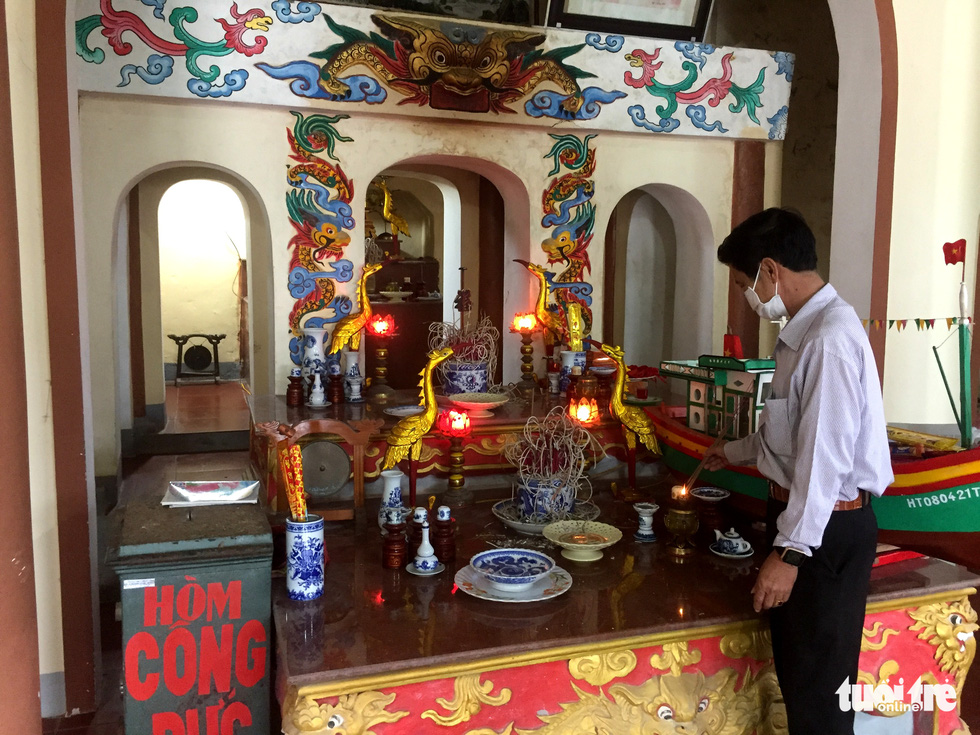 |
| The main shrine to worship the Nam Hai Nhan Ngu Ton Than. Photo: Le Minh / Tuoi Tre |
Phuong recalled that he has worked as a seafarer since he was little but has yet to struggle in the sea to be saved by whales.
However, his late predecessor in the temple management board told him that the former had encountered an incident in the sea and was brought to the shore safely by a whale.
The whale burial and worship custom was established a long time ago and is not a superstitious belief. All of the local fishermen have faith in whales, believing that whales are their good friends as well as the savior of many previous generations, Phuong asserted.
Pointing out three earthen graves, Phuong said that three whales washed ashore in Cam Nhuong last year and were then buried by local residents.
Two years after their funerals, their graves will be relocated to the tomb area.
Every year, local people in Cam Nhuong Commune hold the Cau Ngu (whale worship) festival at the Ngu Ong Temple on April 8 to pray for good weather and safe fishing trips.
On the first and the 15th day of each lunar month, local people visit the temple to perform rituals and offer incense sticks at a local cemetery for whales.
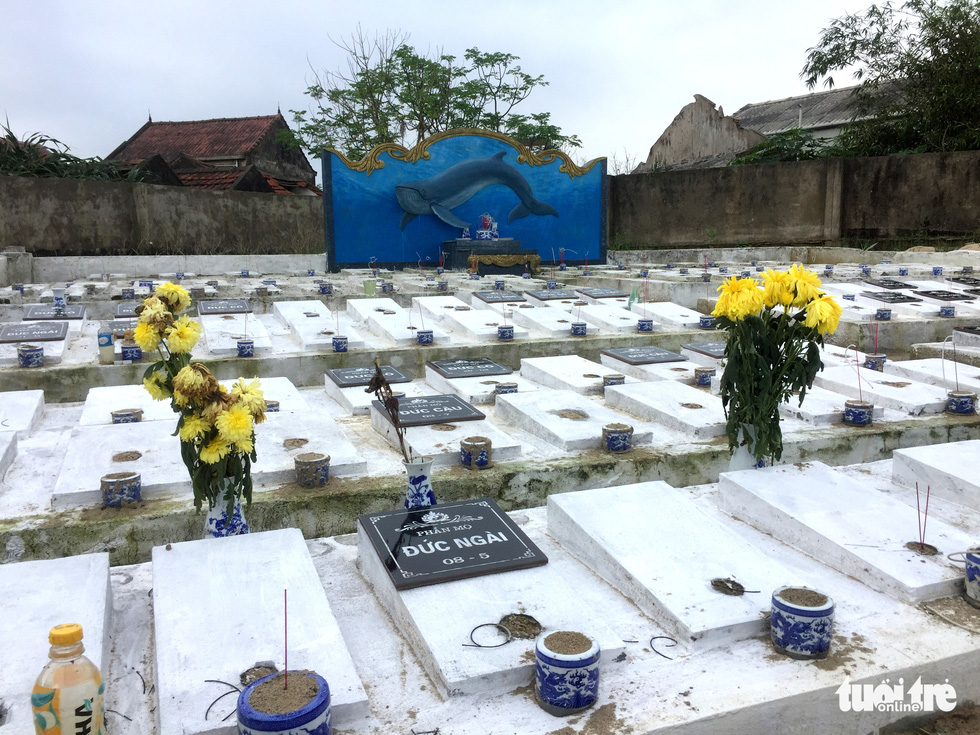 |
| Whale graves built in orderly rows, with gravestones showing the dates the whales passed away. Photo: Le Minh / Tuoi Tre |
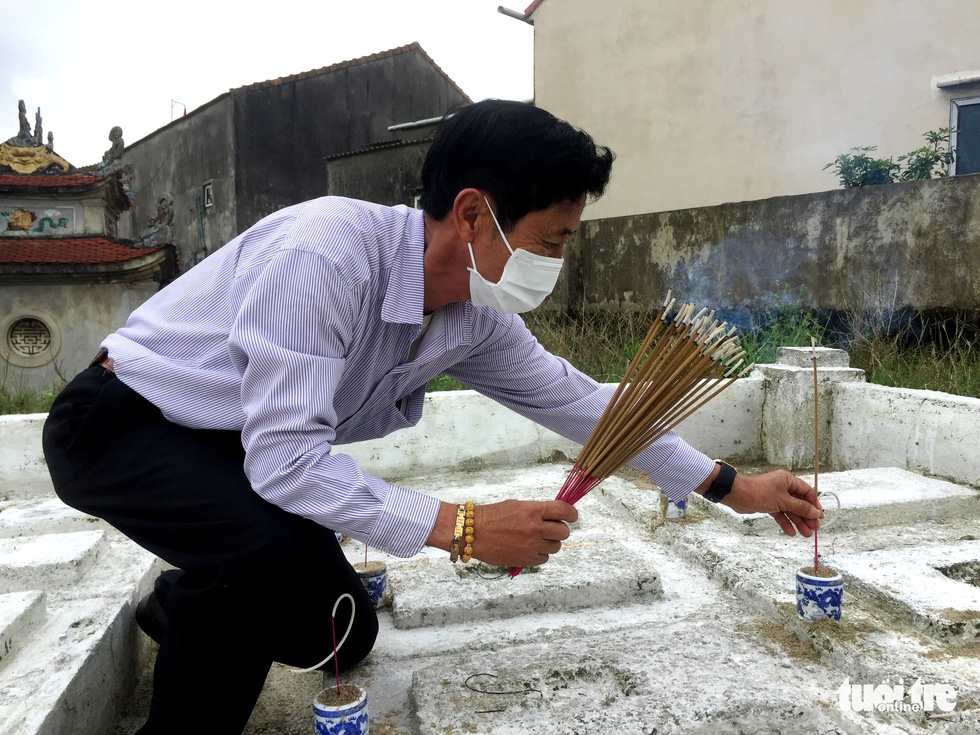 |
| The head of the management board of the Ngu Ong Temple offers incense at whale graves. Photo: Le Minh / Tuoi Tre |
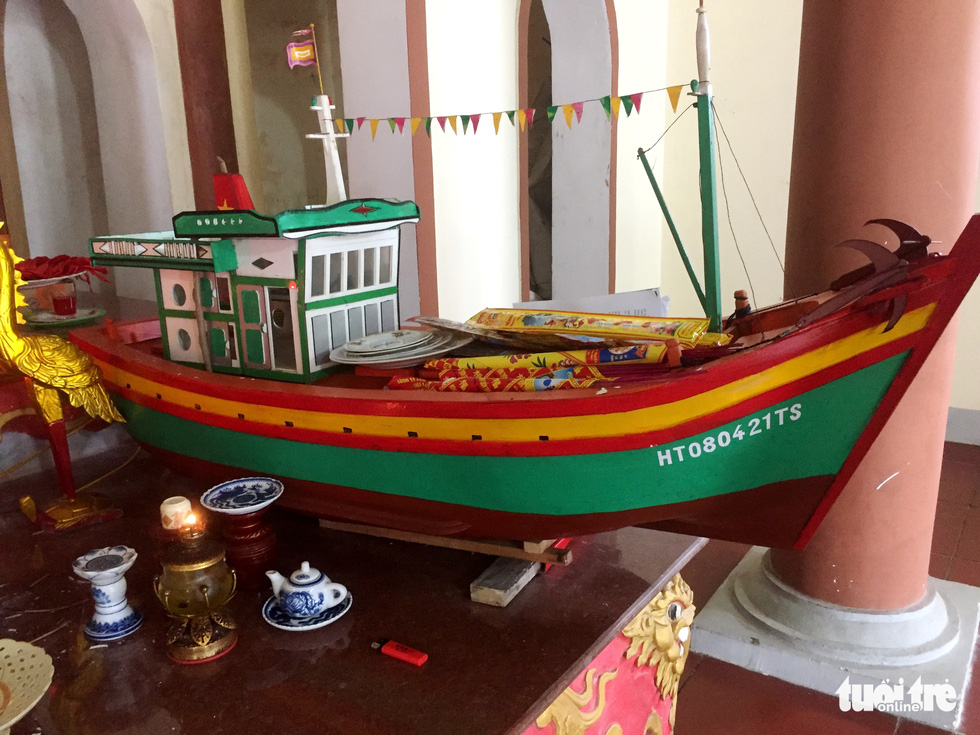 |
| Offerings prepared by local people for the Cau Ngu festival held on April 8 annually. Photo: Le Minh / Tuoi Tre |
Like us on Facebook or follow us on Twitter to get the latest news about Vietnam!



